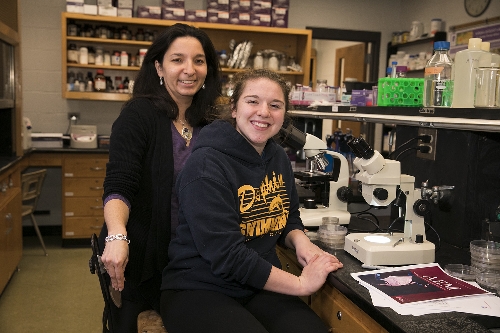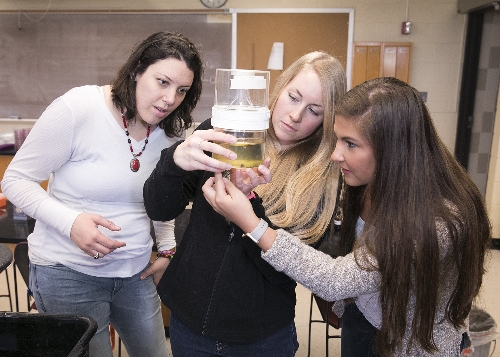Collaboration with Faculty Enhances Student Experiences at Western
July 27, 2017

Andrea Porras-Alfaro and Paris Hamm
[Download Print-Quality Image]
MACOMB, IL – One indicator of a well-rounded academic experience is the collaborative opportunities the institution's faculty offer students outside the traditional classroom.
Across the academic disciplines, Western's faculty work directly with students to conduct research, which can result in ground breaking work and scientific discoveries that have implications reaching far beyond WIU's campus.
The work of two faculty/student teams within the WIU Department of Biological Sciences is branching out to create partnerships with other universities around the nation and netting discoveries that have potential uses in medical treatments. The research work also creates a web of academic networking and eventual career opportunities for students.
"Batty" for Science
When Paris Hamm came to Western to study biology, she only had to travel across town to get to campus. As a graduate of Macomb High School, Hamm completed her bachelor's degree in biology and French at Western in 2015, and continued on to graduate school at WIU. After her May graduation, Hamm is headed to the University of New Mexico to begin her doctoral work.
She chose New Mexico because of a research collaboration she and WIU Associate Professor of Biological Sciences Andrea Porras-Alfaro have spent many months cultivating. Hamm and Porras-Alfaro recently published the March cover story in the academic journal of the America Society of Microbiology, titled "Western Bats as a Reservoir of Novel Streptomyces Species with Antifungal Activity."
The bats Hamm used for her research were collected by researchers at the University of New Mexico. The bats' wings were swabbed by researchers there, and the more than 1,700 specimens collected were tested by Hamm in Porras-Alfaro's fungal ecology lab in WIU's Waggoner Hall.
The result of the testing was Hamm's discovery of 15 new types of bacteria, which produce antifungals to control a fungus that is currently causing high mortality among bats in the United States and Canada. Another product of the work is further research into how these bacteria can be used in the development of antifungals and antibiotics for use in the medical field.
"There is a bigger impact for not only the bats, but also for society as a whole," said Porras-Alfaro.
Hamm's research, which includes work on White Nose Syndrome in bats, a devastating disease in bats and caused by a fungus, also captured the attention of the United States Department of Agriculture (USDA) field office in Peoria, IL. WIU students have previously completed internships at and been hired by the USDA thanks to these collaborative efforts.
Researchers from multiple institutions have also expressed interest in the research into the potential to control infectious diseases and the discovery of novel antibiotics.
Porras-Alfaro said the collaborative efforts enhance the opportunities students have for graduate school or careers after graduation from Western.
"The difference between Western and larger schools is that we provide unique opportunities for one-on-one mentoring," she said. "This University is very supportive of faculty/student research and that is what makes us unique as an institution."
There are several WIU programs that helped Hamm have the scholarship and professional conference attendance opportunities she has, including the College of Arts and Sciences, the Department of Biological Sciences, the office of Graduate Studies, the Women in Science program and the Research Inspiring Student Excellence (RISE) program.
"Through my research, I learned I was happy working in the lab and I am so glad I changed from wanting to be a doctor to do more teaching and research," said Hamm. "A lot of this came from learning from Dr. Porras-Alfaro; having her as a mentor has made a huge impact."
Because of her discovery of the 15 new types of bacteria, Hamm will have the honor of naming them. While she is still pondering what those names will be, she said she told her mother, Annette, that one would be named after her.
Porras-Alfaro said when she writes grant proposals to fund her research, she always builds in funding to hire Western students as research assistants. She said the path her research projects take sometimes depends on the passion of the students and the areas they are most interested in studying further. Grant funding that promotes student involvement has come from organizations like the National Park Service, the National Science Foundation and the U.S. Department of Energy.
"This allows students to focus on the research and build their career opportunities, instead of having to get a part-time job to pay the bills," she said.
Porras-Alfaro praised Hamm's recent publication, saying it is difficult for students to have their work published in an academic journal before their master's degree is completed.
"As a faculty mentor, I have gained so much working with students like Paris," she said. "Students have a different perspective on things I might not see and then together we develop new projects. Faculty-student mentoring allows us to grow together. It is difficult for students to get these kinds of experiences like from just the classroom."
Those Pesky Opportunities
WIU Biological Sciences Assistant Professor Catherine Miller-Hunt has turned researching nature's "pests" into important findings that have numerous implications from academic to medical.
In her vector-biology lab at Western, Miller-Hunt involves students in a variety of research activities that both aid her findings and enhance the students' learning experiences.
"Research studies show that undergraduate and graduate students who do some sort of research activity are more engaged in their academic program and do better in their classes," she said. "It also enhances their educational experience and shapes their future."
As a Macomb High School and a 2002 WIU graduate, Miller-Hunt returned to Western after getting her advanced degrees at the University of Iowa. Her husband, Jason Hunt, is a doctoral student in WIU's Environmental Science program. He also teaches dual credit classes for Carl Sandburg College at West Prairie High School in Sciota, IL and partners with Miller-Hunt for her work studying the mosquito and tick populations in the region.
The husband and wife research team involves students in every aspect of their work, from tracking and capturing the mosquitos and ticks to testing them for the diseases they carry.
WIU doctoral student Michelle Rehbein, of Darien, IL, received her bachelor's and master's degrees in biology from Western. She said she started school with a general interest in science, but decided to continue her education after becoming more passionate about it.
"I wanted to continue the learning process," she said. "I started in health sciences and then I took immunology and Dr. Miller-Hunt and I got more into it. She introduced me to mosquito research, filed work and surveillance – it was like health sciences and biology together. It's great to have a mentor who takes you under their wing and gives you hands-on experience. It's not only fun, but you learn so much too. Being a part of this vector team got me more involved with organizations in the school. One thing just leads to another. "
After finishing her doctoral studies in environmental science, Rehbein said she would like to work in the conservation field in Colorado and Wyoming.
Miller-Hunt said she is proud to help guide and shape students toward attaining their academic and career goals. Like Porras-Alfaro, she said the research she and her students conduct in their laboratories at Western has attracted the attention of other universities and governmental agencies.
The tick and mosquito research has led to new relationships with the United States Department of Agriculture and the University of Illinois.
This summer, Hunt and Miller-Hunt will work with students to conduct research on ticks in west central Illinois.
"We will be conducting a survey to figure out what is out there," said Miller-Hunt. "We want to expand on the information that is already there and see what the ticks are carrying. This is our fourth year gathering data this way and we use undergraduate WIU students to help. We train them how to sort the ticks and how to do the testing."
Miller-Hunt said she and her students will be collecting ticks from anyone who wants to drop them off or mail them to her lab in Waggoner Hall, room 279. The ticks can be put in a plastic bag with rubbing alcohol or frozen to be preserved.
"This work impacts everyday life and we want to make people more aware," said Miller-Hunt. "We want to get people thinking about the diseases ticks and mosquitos carry."
In addition to the collaborative research opportunities available in WIU's Department of Biological Sciences, the faculty also benefit from each other. Miller-Hunt said Porras-Alfaro has been her mentor and is someone whose work she wants to model.
"That is why I put my office right next to hers," Miller-Hunt said. "I hope to get those grants that will enable students to have the full internship experience in my lab."
For more information about the WIU Department of Biological Sciences and the programming it offers Western's students, visit wiu.edu/biology.
Posted By: Jodi Pospeschil (JK-Pospeschil@wiu.edu)
Office of University Communications & Marketing


Connect with us: